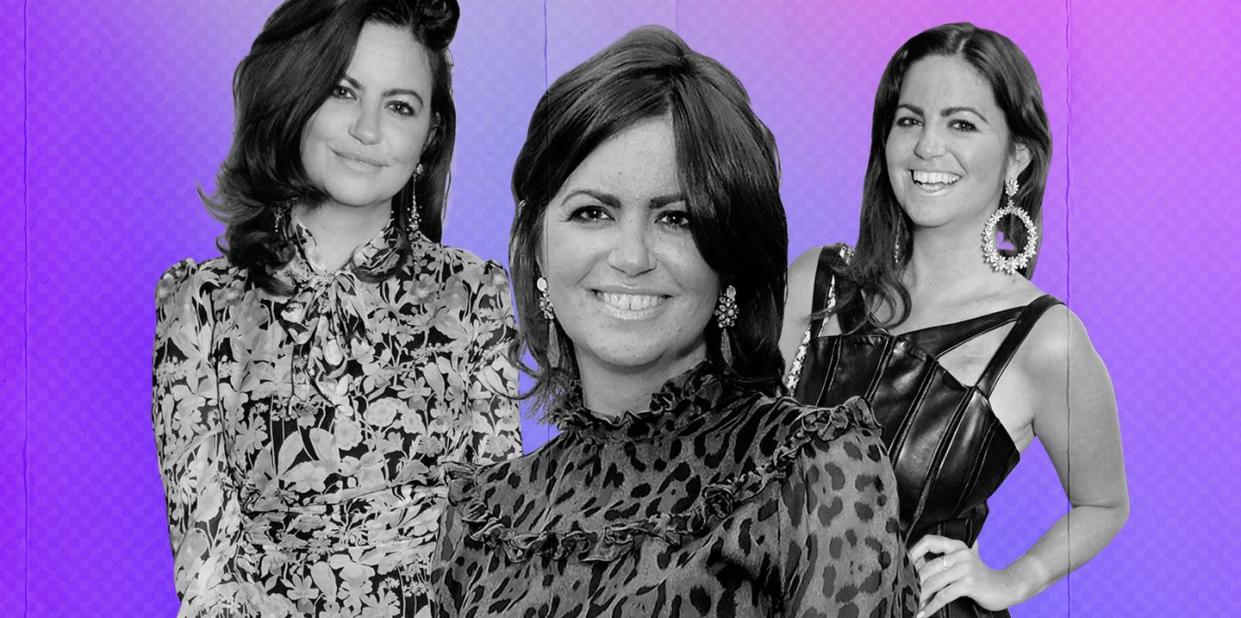What Dame Deborah James taught me about finding the joy in life – no matter how dark it seems

I thought of her in fading patches of sunlight. I saw her wrapped up in cherry pink, in leopard print, in mirror ball sparkles. I rarely run, but when I do, I still imagine her strength within my own legs. Last Easter, I plonked fluffy bunny ears on myself… and anyone who passed my way in the pub. Later, I learned that she had worn a pair that day too.
There she had been, on Instagram. Far away from me, with her bunny ears’ candy colours brightening the off-white of her hospital gown. A small thing and a total coincidence but it made me smile, this unknown synergy between us.
I could go on. List all the ways she has had an impact on me. But I am already risking sounding quite odd, creepy even. After all, I didn’t know Deborah James, and yet she is a woman who has had a visceral influence on my life, one which I carry with me each day. That reinforces how I look at the world around me. And judging by the new documentary about her emotional story (and the response to it), Deborah James: Bowelbabe in Her Own Words, it’s evident that I’m far from alone in being moved and, ultimately, heartbroken by all that Deborah went through – but also extremely spirited by the way she dealt with her illness.
The thing is, as we move through our seconds, those who make a dent on our lives can come in surprising forms. We expect our parents, our friends, our colleagues and those who we encounter regularly to move and change us.
Yet, we’re less accustomed to the correct form of behaviour when it’s someone we only know through the rectangle of our phone screen. It can feel silly and almost childish, like kissing a poster of your favourite pop star goodnight. But Instagram has opened up a window into the lives of others so widely, it’s impossible to not feel close to strangers. To feel touched by their lives, to laugh, smile and cry with them.
And I know I’m just one of thousands who feel this way about Dame Deborah James, the podcaster, journalist and campaigner, who – in 2016, at 35 – was diagnosed with bowel cancer and sadly passed away from it, last June aged 40. After receiving her cancer diagnosis, she charted her life on Instagram, in her column in The Sun and through her role as a co-presenter on the BBC’s You, Me and The Big C podcast, as well as publishing two books, F*ck You Cancer and How To Live When You Could Be Dead, where she explains how to flip your mindset from a negative spiral into “realistic and rebellious hope”. It’s that attitude of hers I admire so much.
I first heard Deborah speak a few years after her diagnosis. It was 2018 and I was sitting on the ground in a white tent, festooned with hot pink balloons, grass tickling my shins. I’d just – along with my Cosmopolitan colleagues – completed a Race For Life, and she was one of the guest speakers, telling us where the money we raised would go, alongside sharing her own story. I thought she was inspiring (of course I did, it would be impossible not to). I also thought it was desperately unfair that this was happening to her. But, above all, I thought she was really fucking cool. I wanted to be her friend.
So I did what we all do when we find someone who we’d love to become inner circle close with (but know that’s incredibly unlikely): I followed her on social media, invested – like so many – in her journey. A journey, I was convinced, would end happily.
But, after years of various gruelling but vital life prolonging treatments, Deborah passed away on 28 June 2022. It felt like the impossible had happened. How could someone so vibrant ever be stopped? As mentioned in the documentary, Prince William even visited Deborah at home to make her a Dame, for her tireless campaigning to raise awareness of bowel cancer – and even after her death, that continued. Deborah went on to raise more than £10 million (and counting) for Cancer Research UK and other vital research projects through her Bowelbabe fund on JustGiving. She was, and still is, the definition of unstoppable.
“As emotional as it all is, we are finding so much to smile about in the sadness,” she said of her final weeks. “I may be getting weaker and more tired… having run off pure adrenaline, but my word, I always said I wanted to slide in sideways when my time is up, with a massive smile, no regrets and a big glass of champagne! Still my intention.”

It’s those words that sum up exactly why her way of life means so much to me. Whether it’s her wardrobe of clashing colours or the clips of her dancing to cheesy music around a chemo drip, she always seemed to be surviving brightly. That’s not to say she’d glitter lacquered over the hard stuff, or faked smiles, throughout the hardest parts. She let us in on them too, even more so in the new BBC film. Something that’s just as important as her optimism.
But that sheer lust for life? It’s more than inspiring to me, it’s a call-back to my own days of watching cancer devour my mum. As, like Deborah, she endured so much terror – the steroids causing her face to swell twice its size; the brain tumour tugging and pulling at her memories, turning her once sharp mind into an uncontrollable and unknown mass; the pain that not even the strongest morphine dose could quell and (this one is hard to type) the excruciating reality that she wouldn’t see her two children grow up. But she faced all of that by searching for slivers of joy, wherever she could.
I should make clear that I’m not saying to those who are currently facing cancer (or indeed any life threatening illness) that you should just shove on some sparkle, a slick of gloss and throw your head back in mock laughter. I know how incredibly hard it is, when your world is fading to darkness around you, to search for neon brightness within that. No one should feel forced into toxic positivity.
And, optimism – as I know from my mum, as we’re seeing with Deborah – can’t save a life. It’s just that existing in a glass-half-full way is often sneered at, it’s seen as cheesy and a bit silly. It’s confused for naivety. When, from my experience, it’s one of the most powerful tools we have, and utilising it – when we can – creates a domino-effect of difference, that can reverberate for years.
My mum, when she was dying (she was diagnosed with days to live, she survived for months) relished in soft silk scarves, she filled her hospice sink up with Vinho Verde, the green wine we used to drink together on a Portuguese beach. She made jokes about her illness, used it to – not only pass on sage advice that we had to listen to (“I’m dying, you have to!”) but also, one memorable time, to wheel on over to Christian Slater when we spotted him in a bar and force him to say hello to me (“he could hardly say no”).
I took on this attitude. Even when my grief turned me on auto-pilot, when I felt like I had been replaced by a walking, talking replica of who I once was, I’d slurp on J20s, as you could buy them for 50p in the hospice canteen, marvelling at this unexpected bargain. I’d tie scarves around my jeans and wear bright baker boy hats to see her (it was the noughties, okay). At Christmas, as she lay in a coma, I put up our nativity scene, chatting her through – as cheerily as I could muster – each step. “Here’s the camels dad brought back from India, here’s baby Jesus…” I used my strength in searching for the tiniest of joys, where I could.
It really wasn’t easy. My dad used to always say “crying is easy, it’s the laughter that takes the work.” It also didn’t change anything, she still died, my entire life crumbled and I mourned her (and do still) knowing I will never, ever entirely heal from that loss. But it helped. It still helps. I know – with total certainty – that there were many moments, during her death, that mum felt happy. That she felt full of life, even as it was being drained out of her. My grief has taken me, in the years since, to some deeply dark places but the comfort of that, and the knowledge that I carry her bright optimism within me, has pulled me through. All of this, and the myriad of other complex emotions that grief brings, is what prompted me to start a newsletter on the subject.
And now – along with tens of thousands of others – I carry Deborah’s leopard print, glossy lipped optimism with me too. She, despite everything, taught so many people how to live. There are countless things that Dame Deborah has left in her legacy, but, for me, it’s the image of her, wheeled out the front of the hospital, bunny ears on her head, closing her eyes and feeling the golden sunshine on her face that will stand the test of time.
Donate to the Bowelbabe fund here
You can follow Catriona on Instagram, and her newsletter where she discusses grief can be found here
You Might Also Like

